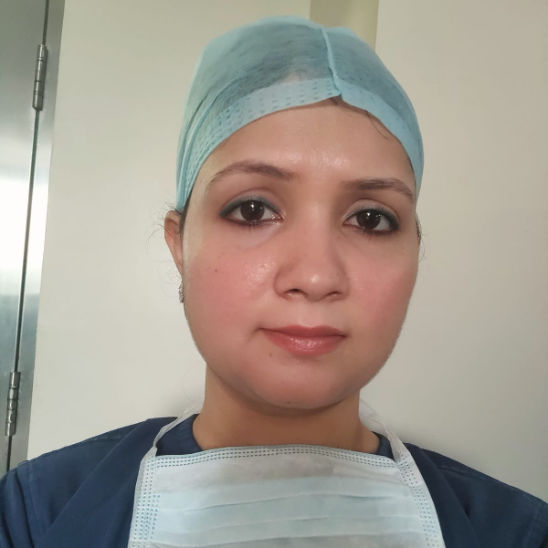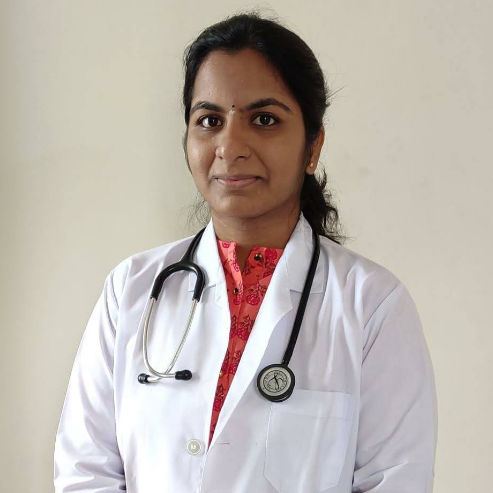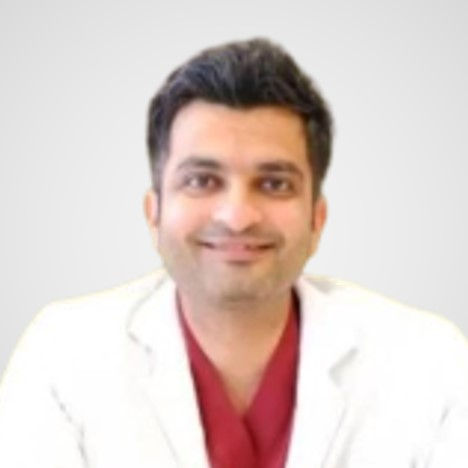Relevance
Consult General and Laparoscopic Surgeons Online (137 doctors)

Dr. Saurabh Bansal
General and Laparoscopic Surgeon
17 Years • MBBS, DNB (General Surgery), FNB (MAS), Certificate Course in CRS,SAGES
New Delhi
THE CLINICS, New Delhi
Dr. Renu Pimpale
General and Laparoscopic Surgeon
14 Years • MBBS,MS(General Surgery), FMAS
Pune
Dr. Aniruddha's advance ortho and polyclinic, Pune

Dr. Shitij Arora
General and Laparoscopic Surgeon
6 Years • MBBS,MS (GENERAL SURGERY), FMAS, DMAS
New Delhi
THE DOCTORS NESST, New Delhi
Dr. Subrat Tripathi
General and Laparoscopic Surgeon
25 Years • MBBS, MS, CIH
Vadodara
Surabhi Hospital, Vadodara

Dr. U Shirisha
General and Laparoscopic Surgeon
9 Years • MBBS,DNB GENERAL SURGERY,FIAGES
Madeenaguda
Hyderabad Laser Surgery, Madeenaguda

Dr. Vedavathi K Nandini
General and Laparoscopic Surgeon
13 Years • MBBS,MS,DNB,EFIAGES (General Surgeon)
Bengaluru
Apollo Clinic, Sarjapur Road, Bengaluru
Dr. Amol Sidhalingappa Jeur
General and Laparoscopic Surgeon
17 Years • MS (General Surgeon), DMAS, FMAS, FIAGES, FALS Hernia, Fellowship in Colorectal Surgery(South Korea), Fellowship in Bariatric & Metabolic Surgery
Bengaluru
Apollo Clinic, Sarjapur Road, Bengaluru

Dr. Richa Mishra
General and Laparoscopic Surgeon
8 Years • MBBS, DNB General surgery
Bengaluru
Apollo Clinic, JP nagar, Bengaluru

Dr G Prathyusha
General Physician/ Internal Medicine Specialist
5 Years • MBBS DNB (Family medicine), CCEBDM (Diabetology), PGDGM (Geriatrics), Primary care Rheumatologist.
Bengaluru
PRESTIGE SHANTHINIKETAN - SOCIETY CLINIC, Bengaluru

Dr Anubhav Chittari
General Surgeon
3 Years • MBBS, M.S GENERAL SURGERY
Bengaluru
PRESTIGE SHANTHINIKETAN - SOCIETY CLINIC, Bengaluru
General and Laparoscopic Surgery
Booking an appointment with a top laparoscopic surgeon is now easier than ever with Apollo 24|7. Our user-friendly platform allows you to schedule an online laparoscopic surgeon consultation or an in-person visit at your convenience. With a wide network of trusted hospitals and clinics, Apollo 24|7 ensures that you have access to the best laparoscopic surgeons. Our experienced surgeons offer competitive laparoscopic surgeon fees. Take the first step towards better health and book a laparoscopic surgeon today!
What is General and Laparoscopic Surgery?
General and Laparoscopic Surgery is a medical specialty focusing on abdominal contents including the oesophagus, stomach, small intestine, large intestine, liver, pancreas, gallbladder, appendix, and bile ducts, as well as other organs that may be approached laparoscopically such as the thyroid gland. This specialty is highly relevant in modern healthcare for its minimal invasiveness.
Laparoscopic surgery, also known as minimally invasive surgery, involves small incisions to insert a camera and instruments, leading to reduced recovery times, less postoperative pain, and lower infection risk compared to open surgery. This type of surgery is favoured in numerous common procedures, such as gallbladder removal, hernia repair, and certain bariatric surgeries.\
Who is a General and Laparoscopic Surgeon?
A General and Laparoscopic Surgeon is a highly trained medical specialist who performs a range of surgeries primarily focused on the abdominal area but may also include other procedures like hernia repairs or thyroidectomies.
Qualifications for a General and Laparoscopic Surgeon include a medical degree followed by specialised surgical training, often culminating in board certification. These surgeons must master both traditional open surgical techniques and the advanced skills needed for laparoscopic procedures.
They manage conditions ranging from appendicitis and gallbladder diseases to obesity and colon cancers, playing a critical role in diagnosis, pre-operative, operative, and post-operative management.
What Does a General and Laparoscopic Surgeon Do?
A General and Laparoscopic Surgeon diagnoses, treats, and manages a wide array of surgical conditions, predominantly affecting the abdomen and other areas accessible by minimally invasive techniques. Their key responsibilities include:
Preoperative Evaluation: Surgeons conduct thorough assessments to determine if surgery is necessary, explaining the procedure, risks, and expected outcomes to patients.
Surgical Procedures: They perform surgeries using both traditional and minimally invasive techniques. Common surgeries include gallbladder removal, hernia repairs, etc.
Postoperative Care: After surgery, they monitor patients’ recovery, manage complications, and provide follow-up assessments to ensure optimal outcomes.
Emergency Care: They handle urgent surgical conditions such as appendicitis and perforated bowel, providing timely interventions that are often life-saving.
Collaboration with Healthcare Professionals: Regular interaction with a multidisciplinary team to plan and coordinate long-term patient care.
Continuous Learning and Development: Keeping up-to-date with the latest surgical techniques and medical research to improve patient care and surgical outcomes.
By performing these roles, General and Laparoscopic Surgeons ensure comprehensive patient care, focusing on minimising discomfort and ensuring faster recovery, essential for improving the overall effectiveness of surgical interventions in healthcare.
What are the Other Sub-specialities of General and Laparoscopic Surgery?
General and Laparoscopic Surgery encompasses a variety of sub-specialities, each targeting specific organs and systems within the body. Understanding these sub-specialities can provide insight into the broad scope of surgical interventions available in modern healthcare. Here is an overview of some key areas:
Bariatric Surgery: This sub-speciality focuses on weight loss procedures which help manage obesity. Techniques often involve laparoscopic methods to reduce stomach size or reroute the intestines, which helps patients achieve significant and sustained weight loss.
Colorectal Surgery: Surgeons specialise in the medical and surgical treatment of diseases of the intestinal tract, colon, rectum, and anus. They handle conditions ranging from colorectal cancers and inflammatory bowel disease to prolapses and haemorrhoids.
Endocrine Surgery: This area involves operations on endocrine glands (e.g., thyroid, parathyroid, and adrenal glands) to treat conditions such as tumours, hyperfunctioning glands, and cancer.
Hepatobiliary Surgery: Focused on diseases of the liver, gallbladder, biliary tree, and pancreas, this sub-speciality handles complex surgeries like liver resections and transplants, often using minimally invasive approaches.
Minimally Invasive Surgery: A broad area that uses techniques like laparoscopy to perform surgeries with less damage to the body than standard open surgeries. It’s commonly applied in many abdominal procedures, including those for gallbladder, hernias, and gastric issues.
Trauma Surgery: Trauma surgeons handle urgent care for acute injuries, primarily focusing on abdominal injuries that require immediate surgical intervention to save lives.
Abdominal Surgery: Encompasses a wide range of surgeries within the abdominal cavity, addressing organs such as the spleen, stomach, and intestines, often through laparoscopic methods.
Gastrointestinal Surgery: Surgeons in this field manage diseases of the gastrointestinal tract and related organs like the oesophagus, stomach, small intestine, large intestine, liver, gallbladder, and pancreas.
Thoracic Surgery: Although generally considered separate, some general surgeons extend their expertise to thoracic organs, handling surgeries involving the lungs and other structures within the chest, excluding the heart.
Surgical Oncology: This sub-speciality is focused on the surgical management of tumours, both benign and malignant. Surgical oncologists often work closely with other oncologists and radiologists to provide comprehensive cancer care that may involve surgery as a primary treatment or as part of a broader treatment plan.
These sub-specialities illustrate the diversity and complexity within the field of General and Laparoscopic Surgery, each playing a crucial role in targeted medical interventions and patient care.
What are the General and Laparoscopic Surgery Examinations or Tests Performed by the General and Laparoscopic Surgeon?
General and Laparoscopic Surgeons perform a variety of diagnostic tests and examinations to assess and diagnose conditions requiring surgical intervention. These tests are crucial for planning effective treatment strategies. Here are some of the most common diagnostic tests used in this field:
Ultrasound: Often used by surgeons to visualise organs within the abdomen, such as the gallbladder, liver, and kidneys. It helps in diagnosing gallstones, which might require the intervention of a gallbladder removal surgeon.
Computed Tomography (CT) Scan: Provides a more detailed look at the abdominal organs and can identify issues such as hernias, tumours, or appendicitis. This is particularly useful for a hernia surgery specialist preparing for surgical repair.
Magnetic Resonance Imaging (MRI): Used for high-resolution images of the abdominal and pelvic organs, MRI can be crucial in planning complex surgeries that may involve intricate structures within the body.
Endoscopy: Allows direct visualisation of the gastrointestinal tract, including the oesophagus, stomach, and parts of the intestine, often used to diagnose ulcers, tumours, or bleeding.
Biopsy: Involves the removal of small samples of tissue from organs to be tested for diseases like cancer. This is essential in surgical oncology to determine the presence and type of cancer.
Blood Tests: Common tests include liver function tests, complete blood count, and markers for inflammation or cancer. These help in assessing the overall health of patients and pinpointing issues that might necessitate surgery.
Laparoscopy: Not just a surgical procedure, laparoscopy can also be a diagnostic tool, especially in assessing abdominal pain or injuries. This minimally invasive technique involves inserting a camera into the abdomen to look directly at the organs and the abdominal cavity.
These examinations and tests are fundamental in enabling General and Laparoscopic Surgeons to provide accurate diagnoses, plan effectively for surgery, and manage post-operative care, ensuring patients receive the most appropriate and targeted treatments.
What are the Common Conditions & Diseases that General and Laparoscopic Surgeons Treat?
General and Laparoscopic Surgeons address a wide array of conditions, focusing on diseases that involve the abdominal area and beyond. Here are the top 15 conditions they commonly treat:
Gallstones: Hardened deposits of digestive fluid in the gallbladder, causing pain and infection.
Hernias: A condition where an organ or tissue protrudes through a weak spot in the surrounding muscle or connective tissue.
Appendicitis: Inflammation of the appendix, often requiring urgent surgical removal.
Gastroesophageal Reflux Disease (GERD): A digestive disorder where stomach acid frequently flows back into the tube connecting your mouth and stomach (oesophagus).
Peptic Ulcers: Open sores that develop on the inside lining of your stomach and the upper portion of your small intestine.
Inflammatory Bowel Disease (IBD): Includes Crohn's disease and ulcerative colitis, which involve chronic inflammation of the gastrointestinal tract.
Diverticulitis: Inflammation or infection of small pouches called diverticula that develop along the walls of the intestines.
Colon and Rectal Cancer: Cancers that affect the colon and the rectum, part of the digestive tract.
Obesity: Often treated surgically with bariatric surgery to help lose weight and reduce the risk of serious health problems.
Pancreatitis: Inflammation of the pancreas, which can occur as acute (sudden) or chronic (long-lasting) forms.
Thyroid Disorders: Including overactive and underactive thyroid conditions that may require surgical intervention.
Liver Cysts: Fluid-filled sacs in the liver, usually benign but sometimes requiring removal for pain or other symptoms.
Spleen Issues: Including enlarged spleen or ruptured spleen, often related to various diseases or injuries.
Adrenal Tumours: Growths on the adrenal glands that may require removal if they are causing symptoms or are malignant.
Hiatal Hernias: Occurs when part of your stomach pushes upward through your diaphragm.
These conditions highlight the broad expertise of General and Laparoscopic Surgeons in diagnosing, managing, and treating complex surgical issues, ultimately focusing on reducing patient discomfort and improving health outcomes.
Reasons to See a General and Laparoscopic Surgeon
Consulting a General and Laparoscopic Surgeon is crucial when experiencing symptoms or medical conditions that might require surgical intervention. Primary reasons to book laparoscopic surgeon include:
Persistent Abdominal Pain: Unexplained or severe abdominal discomfort that does not resolve with standard treatments.
Digestive Issues: Symptoms like chronic acid reflux, difficulty swallowing, or unexplained weight loss.
Visible Lumps or Hernias: Swellings that could indicate hernias or other underlying issues.
Gallbladder Problems: Symptoms such as intense pain in the upper right abdomen or jaundice, suggesting gallbladder stones or inflammation.
Change in Bowel Habits: Persistent changes, including blood in the stool, which could indicate conditions like colorectal cancer or inflammatory bowel disease.
Seeing a specialist for these symptoms ensures timely diagnosis and management, reducing the risk of complications and enhancing recovery outcomes.
What Types of Procedures do General and Laparoscopic Surgeons Perform?
General and Laparoscopic Surgeons are adept at a range of procedures, divided into therapies and surgeries, to manage various conditions effectively. Here’s a breakdown of the top treatments within the specialty:
Top Therapies:
Endoscopic Retrograde Cholangiopancreatography (ERCP): A technique used to study the bile ducts, pancreatic duct, and gallbladder and to extract gallstones.
Colonoscopy: A diagnostic procedure that allows examination of the entire colon and rectum using a flexible, lighted instrument.
Gastroscopy: A procedure where a thin tube with a camera is used to view the upper part of the gastrointestinal tract.
Sigmoidoscopy: An examination of the sigmoid colon and rectal area to diagnose pain, bleeding, or changes in bowel habits.
Thyroid Fine Needle Aspiration (FNA): A biopsy technique that involves taking a sample from the thyroid gland to diagnose thyroid diseases.
Top Surgeries:
Cholecystectomy: The surgical removal of the gallbladder, typically performed laparoscopically to treat gallstones and gallbladder disease.
Hernia Repair: Surgery to correct hernias, including inguinal, femoral, and umbilical hernias, often using minimally invasive techniques.
Appendectomy: Removal of the appendix, usually performed laparoscopically, to treat appendicitis.
Colectomy: Surgical removal of all or part of the colon, often used to treat or prevent diseases and blockages.
Gastric Bypass: A type of bariatric surgery that helps with weight loss by altering the stomach and small intestine.
Nissen Fundoplication: A surgical procedure to treat gastroesophageal reflux disease (GERD) and hiatal hernias.
Adrenalectomy: Removal of one or both adrenal glands to treat conditions such as tumours.
Splenectomy: The surgical removal of the spleen, typically to treat conditions like splenic rupture, disease, or cancer.
Pancreatectomy: The removal of all or part of the pancreas, usually to treat pancreatic cancer or tumours.
Thyroidectomy: Surgery to remove all or part of the thyroid gland, often due to cancer, hyperthyroidism, or goitre.
These procedures highlight the capability of General and Laparoscopic Surgeons to address a broad spectrum of medical and surgical issues, utilising both therapeutic interventions and advanced surgical techniques to optimise patient care and recovery.
Why Choose an Apollo 24|7 General and Laparoscopic Surgeon?
Apollo 24|7 general and laparoscopic surgeons are renowned for their expertise, qualifications, and experience in providing comprehensive surgical care. Our surgeons are highly skilled in performing a wide range of laparoscopic and open surgical procedures, ensuring patients receive the best possible treatment for their specific condition.
At Apollo 24|7, we offer personalised care tailored to each patient's unique needs, with access to advanced treatment options and state-of-the-art surgical facilities. Our surgeons work closely with a multidisciplinary team of healthcare professionals to provide holistic care and support throughout the treatment journey.
Patients can easily book laparoscopic surgeon appointments online through the Apollo 24|7 website or app. We also provide transparent information about laparoscopic surgeon fee and laparoscopic surgeon reviews to help patients make informed decisions about their care.
What to Expect When Visiting a General and Laparoscopic Surgeon?
Visiting a General and Laparoscopic Surgeon typically involves a comprehensive approach to diagnosing and treating surgical conditions. Whether you schedule an in-person visit or an online laparoscopic surgeon consultation, here’s what to expect:
Initial Consultation: Your visit will start with a detailed discussion about your medical history and symptoms. This is crucial for understanding your health background and the nature of your current concerns.
Physical Examination: The surgeon will perform a physical exam, particularly focusing on the areas related to your symptoms to assess any apparent issues.
Diagnostic Tests: Depending on the symptoms, you may undergo various diagnostic tests such as blood tests, ultrasounds, or CT scans to help pinpoint the problem and guide treatment decisions.
Discussion of Findings: The surgeon will explain the results of any tests and discuss potential diagnoses.
Treatment Planning: If surgery is needed, the surgeon will explain the procedure, including the benefits and risks, to help you make an informed decision. They will also discuss alternative treatments if applicable.
This structured approach ensures that every patient receives thorough care tailored to their specific needs, enhancing the chances of a successful outcome.
How Can I Get an Appointment With a General and Laparoscopic Surgeon?
Getting an appointment with a general and laparoscopic surgeon at Apollo 24|7 is easy and convenient. Here's how you can book an appointment:
Online booking through the website: Visit the Apollo 24|7 website and navigate to the "Book Appointment" section. Select "General and Laparoscopic Surgery" from the list of specialities, choose a surgeon based on their profile and laparoscopic surgeon reviews, and select a suitable date and time for your appointment.
Online booking through the app: Download the Apollo 24|7 app on your smartphone, log in or create an account, and follow the steps to book an appointment with a general and laparoscopic surgeon. You can search for surgeons based on location, laparoscopic surgeon fee, and availability.
Offline booking: You can also book an appointment by calling the Apollo 24|7 helpline or visiting your nearest Apollo hospital or clinic. Our staff will assist you in scheduling an appointment with a general and laparoscopic surgeon.
Referral from another doctor: If you have been referred to a general and laparoscopic surgeon by another healthcare provider, you can contact Apollo 24|7 to arrange an appointment with the recommended surgeon or find a laparoscopic surgeon near me.
General and Laparoscopic Surgeons in top cities
- •Best General and Laparoscopic Surgeons in Bengaluru
- •Best General and Laparoscopic Surgeons in Chennai
- •Best General and Laparoscopic Surgeons in New Delhi
- •Best General and Laparoscopic Surgeons in Guwahati
- •Best General and Laparoscopic Surgeons in Kolkata
- •Best General and Laparoscopic Surgeons in Noida
- •Best General and Laparoscopic Surgeons in Pune
- •Best General and Laparoscopic Surgeons in Hyderabad
- •Best General and Laparoscopic Surgeons in Delhi
- •Best General and Laparoscopic Surgeons in Gurugram
- •Best General and Laparoscopic Surgeons in Hyderguda
- •Best General and Laparoscopic Surgeons in Lucknow
- •Best General and Laparoscopic Surgeons in Mumbai
- •Best General and Laparoscopic Surgeons in Nellore
- •Best General and Laparoscopic Surgeons in Karaikudi
- •Best General and Laparoscopic Surgeons in Madurai
- •Best General and Laparoscopic Surgeons in Secunderabad
- •Best General and Laparoscopic Surgeons in Tiruchirappalli
- •Best General and Laparoscopic Surgeons in Arepally
- •Best General and Laparoscopic Surgeons in Bangalore
Related Treatments
- •Treatment for Anal Fissure Treatment Non Surgical
- •Treatment for Acute Diarrhea Treatment
- •Treatment for Anal fissure
- •Treatment for Anal fistula
- •Treatment for Abdominal Pain
- •Treatment for Abdominal Pain Treatment
- •Treatment for Acute Pancreatitis
- •Treatment for Acid Peptic Disorders
- •Treatment for Acid Reflux
- •Treatment for Acidity Treatment
- •Treatment for Acute Pancreatitis Treatment
- •Treatment for Alcoholic Liver Disease
- •Treatment for Anal Cancer
- •Treatment for Electrolyte Disorders
- •Treatment for Acute Burn Care
- •Treatment for Acute liver failure
- •Treatment for Acute lymphocytic leukemia
- •Treatment for Alcohol use disorder
- •Treatment for Ampullary cancer
- •Treatment for Angiofibroma
Related Procedures
- •Doctors for Abdominoperineal resection
- •Doctors for Active Bacterial Treatment
- •Doctors for Adrenalectomy
- •Doctors for Anti-Reflux Surgery
- •Doctors for Appendectomy
- •Doctors for Biopsies
- •Doctors for Botox
- •Doctors for Breast Diseases
- •Doctors for Callus over foot
- •Doctors for Carbon Facial
- •Doctors for Carbon Peel
- •Doctors for Chemical Cautery
- •Doctors for Chemical Peel
- •Doctors for Chemical Peeling
- •Doctors for Cholecystectomy
- •Doctors for Co2 Laser
- •Doctors for Colectomy
- •Doctors for Collagen
- •Doctors for Cryo Abdomen 6s
- •Doctors for Cyst, fibroid, stone, and polyp removals.
FAQs
Who needs general and laparoscopic surgery?
Individuals experiencing abdominal issues such as gallstones, hernias, appendicitis, and gastrointestinal diseases often require general and laparoscopic surgery. This approach is also beneficial for patients needing minimally invasive options for faster recovery and reduced postoperative pain, making it a suitable choice for a wide range of surgical interventions in the abdominal area.
Is general and laparoscopic surgery high risk?
General and laparoscopic surgery carries lower risks compared to traditional open surgery due to smaller incisions and reduced tissue disruption. However, risks vary depending on the procedure's complexity, patient's overall health, and specific conditions being treated. It's essential for patients to discuss potential risks with their surgeon beforehand.
How do I prepare for a laparoscopic surgery?
Preparation includes not eating, drinking, or smoking after midnight the day before the procedure, following specific instructions from your healthcare provider, informing your healthcare provider about any medications you are taking, and arranging for someone to drive you home after the procedure.
What can I expect during recovery?
Recovery typically involves staying in the recovery room for about an hour after surgery, experiencing some pain, receiving pain medication to manage discomfort, following dietary and activity instructions from your healthcare provider, and attending follow-up appointments to check the healing progress.
Why is laparoscopic surgery performed?
Laparoscopic surgery is performed to investigate and treat various abdominal and pelvic issues, such as pelvic/abdominal pain, internal bleeding, pregnancy-related problems, liver disease, ascites, and cancer staging. It is particularly useful when other diagnostic tests like ultrasound, MRI, or CT scans do not provide enough information.
How is a laparoscopic procedure carried out?
The procedure involves making a small incision near the navel or under the rib cage to insert a gas tube, which fills the abdomen with carbon dioxide to provide a clear visual field. The laparoscope is then inserted through this incision, and additional small incisions may be made to insert surgical instruments.
What are the benefits of laparoscopic surgery?
The benefits of laparoscopic surgery include smaller surgical scars, reduced blood loss during surgery, less pain following surgery, shorter hospital stay, faster return to normal activities, and lower risk of infection compared to open surgery.
What are the side effects of general and laparoscopic surgery?
Side effects from general and laparoscopic surgery can include discomfort and pain at incision sites, temporary swelling, bruising, fatigue, and minor digestive disturbances. More severe but less common risks involve infection, bleeding, and complications from anaesthesia, which are generally well-managed with appropriate medical care.
How many hours is general and laparoscopic surgery?
The length of general and laparoscopic surgery can vary significantly, typically lasting from one to several hours based on the complexity of the procedure and the specific surgical issues addressed. Some straightforward operations may take less time, whereas more involved surgeries require extended durations.
Is general and laparoscopic surgery 100% successful?
While general and laparoscopic surgery is highly effective, no surgical procedure can be guaranteed to be 100% successful. Success rates vary by type of surgery and patient specifics such as the condition's severity and the patient's overall health. Nevertheless, these surgeries generally have favourable outcomes with careful planning and skilled execution.